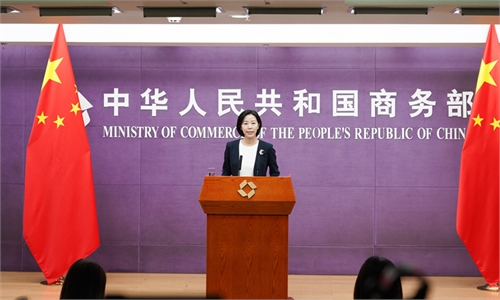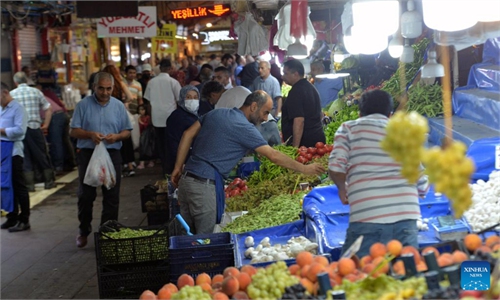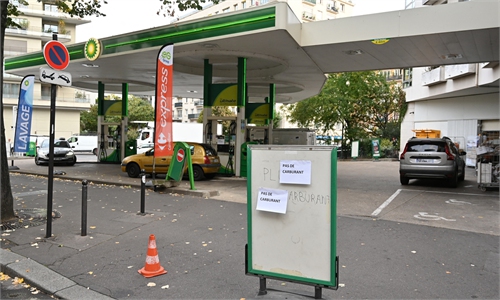China’s Sep CPI remains subdued on price stabilization efforts as West beset by runaway inflation
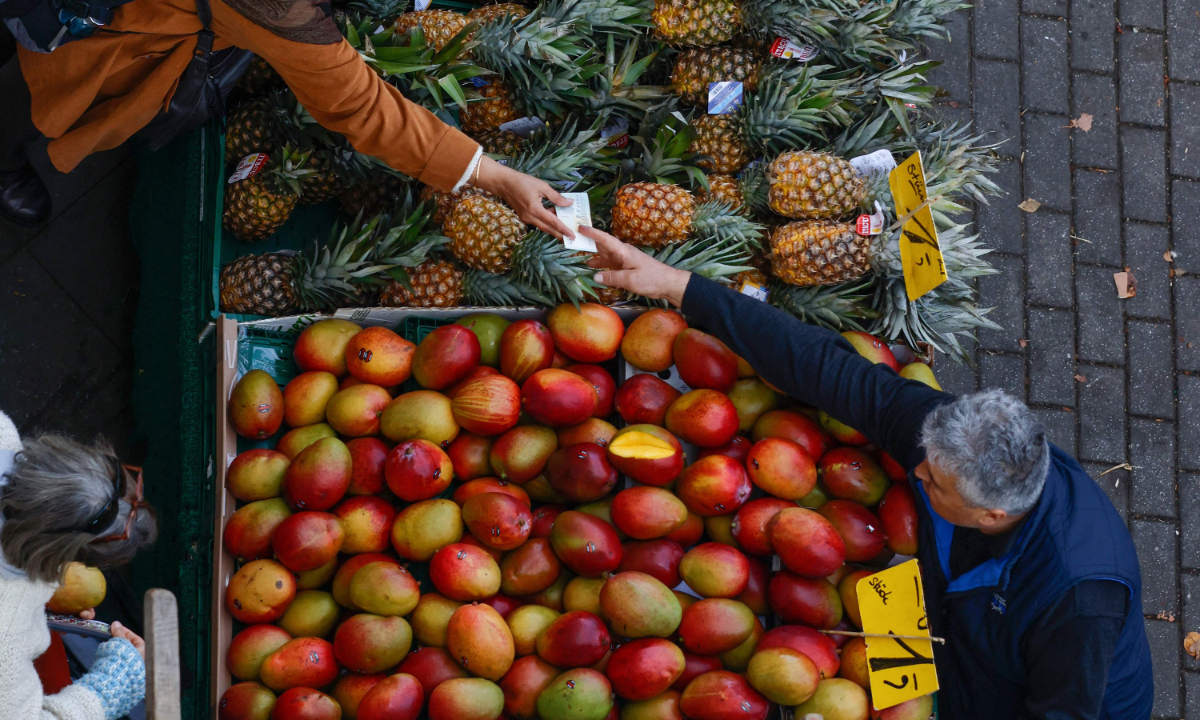
A shopper buys pineapples at a fruit and vegetable market in Berlin on October 14, 2022. Inflation will hit 8 percent in 2022 and 7 percent in 2023, the German government forecast. The government recently unveiled a 200-billion-euro fund to shield consumers and businesses from surging prices, which includes a cap on energy costs. Photo: VCG
China's consumer inflation remained subdued on price stabilization efforts in September, official data showed on Friday, an enviable feat beyond the reach of the US and Europe, which have been beset by runaway inflation.
The country's consumer prices are expected to continue being muted in the foreseeable future, putting the economy in a better position than its global peers amid mounting recession risks, analysts said.
In stark contrast to the overall upward economic trend in the world's second-largest economy, the Western world will have to risk tipping its economy into an almost inevitable recession, as a prolonged period of inflation could make the case for continued drastic monetary tightening moves, they noted.
Over time, this contrast is expected to put China ahead of the curve in refashioning manufacturing, while sinking the West deeper into economic instability.
In a fresh sign of turbulence, Kwasi Kwarteng has been sacked as Britain's finance minister, the BBC reported on Friday, making him the second shortest-serving chancellor after less than six weeks in the job, as the UK government's massive tax cuts triggered a financial market tsunami.
Subdued inflation
China's consumer price index (CPI) rose by 2.8 percent in September from the previous year, data from the National Bureau of Statistics showed Friday.
The reading quickened from a 2.5 percent rise in August and was the consumer inflation's fastest pace since April 2020, but still short of previous market estimates.
Last month, different regions and departments continued to coordinate epidemic containment and economic and social development and took various measures in an all-out effort to ensure supplies and stabilize prices for key consumer staples. Accordingly, the consumer market operated stably overall, Dong Lijuan, chief statistician with the NBS' city department, said in a statement posted on the bureau's website.
The country's move to release pork from central reserves resulted in eased pork price gains, partly weighing on core inflation, according to Ding Yujia, an analyst at Zhixin Investment Research Institute.
Pork prices jumped 36 percent in September, propping up CPI growth by 0.45 percentage points, per NBS numbers.
Over October, pork prices are estimated to maintain growth momentum while prices of vegetables and other foods are expected to be underpinned by a busy consumption season, Ding said in a research note sent to the Global Times on Friday, anticipating that the CPI will hold steady at its September level.
Meanwhile, the producer price index (PPI) gained 0.9 percent in September from the year before. The factory-gate inflation rose at a slower pace for the 11th month in a row.
In Dong's words, prices of international crude oil and other commodities continued a downtrend in September while certain domestic industries saw increased demand, and consequently industrial product prices remained on a downward spiral, but at a moderated pace.
The figures and projections were in line with the IMF's latest forecast that put China's inflation at merely 2.2 percent in 2022 and 2023. Worldwide, however, consumer prices remain a big headache.
Global inflation was forecast to soar to 8.8 percent this year from 4.7 percent in 2021, before declining to 6.5 percent in 2023, IMF data showed on Tuesday.
The US, known for driving on the quantitative easing highway toward hyperinflation before making a U-turn in its monetary policy, is seen mired in singeing inflation.
In a fresh sign of relentless inflation despite the Federal Reserve's supersized rate hikes, the US CPI posted an 8.2 percent spike in the year through September, the US government said on Thursday.
The September reading edged down from 8.3 percent in August, but remained above market expectations of 8.1 percent and hovered at levels last seen 40 years ago.
Embattled by the escalating energy crisis, Europe has found itself in an even hotter seat when it comes to combating inflation.
Annual inflation in the eurozone was expected to rise to 10 percent in September from 9.1 percent in August, according to a flash estimate by Eurostat, the EU's statistical office.
Specifically, energy was slated to have the highest annual rate last month - 40.8 percent versus 38.6 percent in August, per Eurostat.
The polarization in inflation terms mirrors a disparity between China and its major Western counterparts in navigating through recession fears gripping the global economy over the next year.
While a slowdown in global growth is in the pipeline for 2023, China's economy, per the IMF's latest growth projections on Tuesday, is on track for a 4.4 percent expansion from 3.2 percent this year.
This is in stark contrast to the US, which was forecast to see its GDP grow 1 percent in 2023 after eking out a 1.6 percent annual growth in 2022. The eurozone, for its part, will see its economic growth slow to 0.5 percent in 2023 from this year's 3.1 percent.
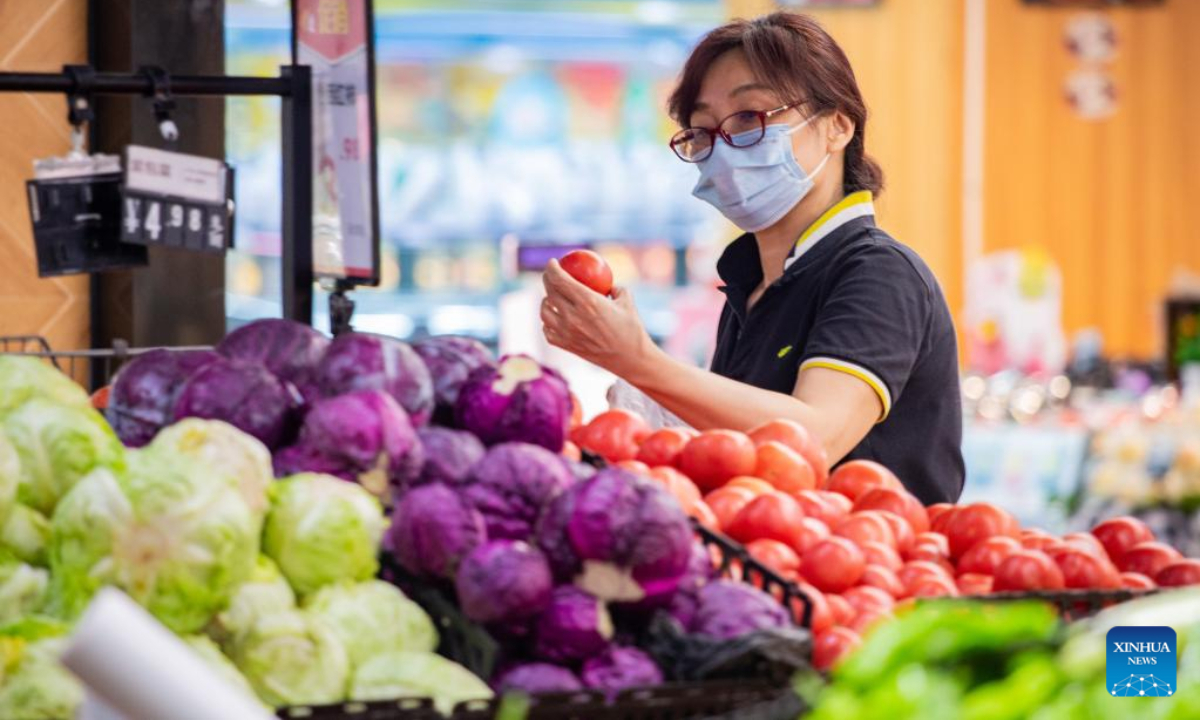
A customer selects vegetables at a supermarket in Nanjing, east China's Jiangsu Province, June 10, 2022. Photo:Xinhua
Better position
China is apparently in a better position to push ahead with its economic recovery, observers said, citing the sustained price stability that is paving the way for its pro-growth moves, while the West is being crippled by the heftier fallout of continued monetary tightening.
The eased factory-gate inflation, in particular, could be fueling the country's commitments to infrastructure construction as lower-cost production is supposed to be an important part of counter-cyclical policies, Tian Yun, former vice director of the Beijing Economic Operation Association, told the Global Times on Friday.
"The sharp divergence between PPI inflation in China and the eurozone (43.3 percent year-on-year in August) suggests China may be gaining a competitive advantage in manufacturing that could help bolster its exports," Nomura economists wrote in a research report sent to the Global Times on Friday.
Official remarks at a meeting of G20 finance ministers and central bank governors in Washington on Thursday also offered insights into China's economic robustness.
In remarks to the meeting held both online and in-person, Yi Gang, governor of the People's Bank of China (PBC), the country's central bank, said that China's price level is basically stable and the central bank will ramp up implementation of its prudent monetary policy to provide more vigorous support for the real economy, read a PBC statement on Friday.
Yi vowed to focus on supporting infrastructure construction and champion financial institutions' extension of loans tailored for renovating equipment in manufacturing, among other key areas.
Addressing the same meeting, Finance Minister Liu Kun called for strengthening macroeconomic policy coordination in order to deal with inflation, food, energy security and other global challenges and avert severe negative spillover effects from some countries' policy adjustments.
In addition to this proposition, as part of a call for true multilateralism, Liu stressed that China will continue to power global economic recovery and provide wider market opportunities for all countries.
As the country's subdued inflation provides leeway for the rollout of more pro-growth measures, the manufacturing sector is notably being primed for a restructuring while the rest of the world is expected to scramble its way out of the current plight, Tian commented, expecting China to stay ahead of the curve in upgrading its higher-end manufacturing sector.
That means increased attractiveness of the Chinese market for global investors, he continued, pointing out that with black swans haunting the global economy, the spotlight tends to fall on China as an increasingly investable destination.
A plunge in the pound and soaring US government bond yields on the heels of UK Prime Minister Liz Truss' unfunded tax cut plans were cited as a recent example of mayhem roiling the Western market.
